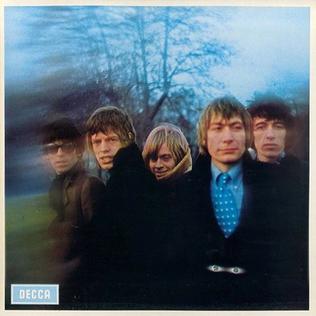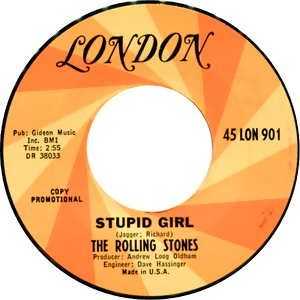
Ian Andrew Robert Stewart was a Scottish keyboardist and co-founder of the Rolling Stones. He was removed from the line-up in May 1963 at the request of manager Andrew Loog Oldham who felt he did not fit the band's image. He remained as road manager and pianist for decades and was posthumously inducted into the Rock and Roll Hall of Fame along with the rest of the band in 1989.

Bill Wyman is an English musician, record producer, songwriter and singer. He was the bass guitarist for the English rock and roll band the Rolling Stones from 1962 until 1993. Since 1997 he has recorded and toured with his own band, Bill Wyman's Rhythm Kings. He has worked producing records and films, and has scored music for film in films and television.

Between the Buttons is the fifth British and seventh American studio album by the English rock band the Rolling Stones, released on 20 January 1967 in the UK and 11 February 1967 in the US as the follow-up to Aftermath. It reflected the Stones' brief foray into psychedelia and baroque pop balladry during the era.

Douglas Arthur "Doug" Wimbish is an American bass player, primarily known for being a member of rock band Living Colour and funk/dub/hip hop collective Tackhead, and as a session musician with artists such as Sugarhill Gang, Grandmaster Flash and the Furious Five, The Rolling Stones, Mick Jagger, Depeche Mode, James Brown, Annie Lennox, and Barrington Levy.

December's Children is the fifth American studio album by the English rock band the Rolling Stones, released in December 1965.

Flowers is the second compilation album by the Rolling Stones, released in the summer of 1967. The group recorded the songs at various studios dating back to 1965. Three of the songs had never been released: "My Girl", "Ride On, Baby" and "Sittin' on a Fence", the first of which was recorded in May 1965 during the sessions for "Satisfaction", and the other two of which were recorded in December 1965 during the first lot of Aftermath sessions. The rest of the album tracks either appeared as singles or had been omitted from the American versions of Aftermath and Between the Buttons.

Metamorphosis is the third compilation album of the Rolling Stones music released by former manager Allen Klein's ABKCO Records after the band's departure from Decca and Klein. Released in 1975, Metamorphosis centres on outtakes and alternate versions of well-known songs recorded from 1964 to 1970.

Darryl Jones is an American bass player. He has been touring and recording with The Rolling Stones since 1993. He has also played in bands with Miles Davis and Sting, among others.
"Connection" is a song by British rock and roll band The Rolling Stones, featured on their 1967 album Between the Buttons. It was written by Mick Jagger and Keith Richards, features vocals by both of them and is said to be about the long hours the band spent in airports. The lyrics contain much rhyming based on the word connection. The lyrics also reflect very heavily the pressures the band was under by 1967:
My bags they get a very close inspection, I wonder why it is that they suspect 'em, They're dying to add me to their collection, And I don't know, If they'll let me go

"Heart of Stone" is a song by the English rock band the Rolling Stones, credited to the songwriting partnership of Jagger/Richards. London Records first issued it as a single in the United States in December 1964. The song was subsequently included on The Rolling Stones, Now! and Out of Our Heads.

"In Another Land" is a song by the Rolling Stones, and the third track on their album Their Satanic Majesties Request. In America, London Records released it as a single a week before the album.

"Let It Bleed" is a song by English rock band the Rolling Stones. It was written by Mick Jagger and Keith Richards and featured on the 1969 album of the same name. It was released as a single in Japan in February 1970.
"Monkey Man" is a song by English rock band the Rolling Stones, featured as the eighth track on their 1969 album Let It Bleed.

The London Howlin' Wolf Sessions is an album by blues musician Howlin' Wolf released in 1971 on Chess Records, and on Rolling Stones Records in Britain. It was one of the first super session blues albums, setting a blues master among famous musicians from the second generation of rock and roll, in this case Eric Clapton, Steve Winwood, Charlie Watts, and Bill Wyman. It peaked at #79 on the Billboard 200.
"Shine a Light" is a song released by English rock band the Rolling Stones' 1972 album Exile on Main St.

"Stupid Girl" is a song by the English rock band the Rolling Stones, featured on their 1966 album Aftermath. It was also issued as the B-side of the U.S. "Paint It, Black" single.
"Parachute Woman" is a song by the Rolling Stones featured on their 1968 album Beggars Banquet.

Bill Wyman's Rhythm Kings are an English blues-rock band founded and led by former Rolling Stones bass guitarist Bill Wyman. Other personnel have varied depending on availability, an arrangement described in The Telegraph as a "a fluctuating squad of veterans". Their concerts and albums tend to emphasize cover songs of blues, R&B and early rock and roll hits from the 1950s. Wyman formed the Rhythm Kings after leaving the Rolling Stones in 1993 subsequent to the extended world-wide tour to support Steel Wheels, citing a desire to work in smaller clubs and avoid the pressure of being in one of the most successful rock bands in the world.
This page is based on this
Wikipedia article Text is available under the
CC BY-SA 4.0 license; additional terms may apply.
Images, videos and audio are available under their respective licenses.












